Best lead screw - ball bearing mount system
-
Hi guys. I am a D- bot owner and I am going to switch to a 3 lead screw driven bed, I am wondering how to best way to mount lead screw , this is my options till now.
Option 1
Kp08 ball bearing - 8mm shaft - flexible coupler - lead screwOption 2
petg made container - 8mm shaft - thrust bearing - ball bearing - flexible coupler - lead screw.
In this case the thrust bearing upper part is inserted in the 8mm shaft while the balls and the lower part are free .
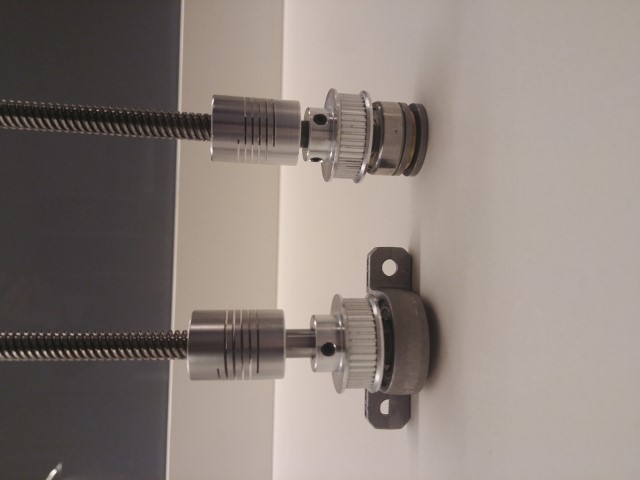
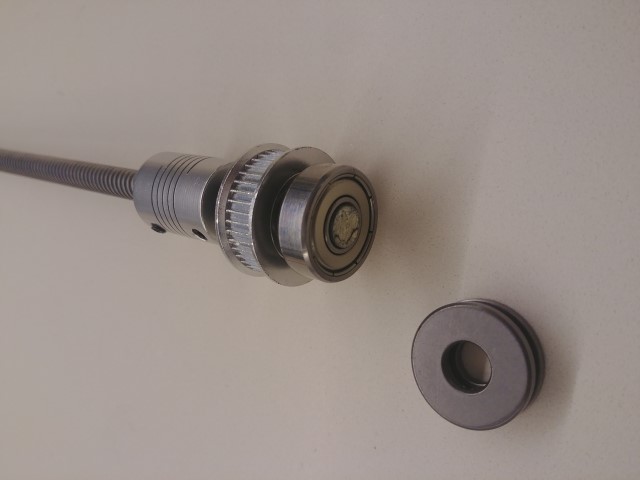
What do you think?
Andrea
-
@claustro Since you have asked, my vote would be option 3. Keep the thrust bearings but ditch the flexible couplings.
-
Or move the flex coupling to the other side of the bearing so the screw is supported but the connection to the motor allow for some misalignment. (Makes less sense for belt driven, and cheap KP08 blocks will most likely not have anything but plain ball bearings which doesn't like thrust. So yeah, option 3
 )
) -
A flexible coupling is used to couple a motor shaft to a screw to allow some small misalignment between the motor and the screw. You don't need a flexible coupling between a pulley and a screw because the pulley can be mounted on the screw. If you use a flexible coupling between the pulley and screw, the belt tension will guarantee misalignment between the two because it will tilt the pulley (and move the end of the screw off axis) as much as the bearing and flexible coupler will allow.
-
I'd just add that if there is any misalignment of the linear guides or, any other inaccuracy that can cause the Z axis to bind or stick a bit, then those couplings can wind up like a spring and absorb some of the linear movement. Then when there is enough tension, they can let go and give bit extra movement. The net result being uneven layer heights. Hence my personal opinion is to ditch them (or use a universal joint or Oldham coupling if you really have to use something).
-
What @deckingman said. You need completely straight lead screws and they should be attached to the frame without potential for movement. If there's any chance the bed can move on its own without input from the motor, then so it will and layers will be uneven.
I'd think that heavier beds are more prone to problems with flexible couplings. I tried various "self aligning" "hassle-free" couplings and they all were just randomizing the error.
-
There are a few printers that have similar motion systems. The one that comes to mind is Herculien and Eustathios. They use a pair of ball bearings to support the screw through a bearing holder and the pulley is grub screwed to the screw, and stop collar to keep the whole mess together. Bearing holder also supports the 10mm shaft. Same block for ball screws and TR8 screws.
https://i.imgur.com/BfKQMK1.png
Hope this screen grab makes sense. The plastic part bolts up to the underside of an 202o extrusion. The top and bottom bore accepts the 608zz bearings, and the pulley goes on the to and acts as a stop collar.
If you go here https://github.com/eclsnowman/Eustathios-Spider-V2
and navigate to the STL's, you can preview the part.
Eustathios-Spider-V2/STL Print FIles/Z_Axis_Leadscrew_Support_V2 (With Tensioner Config_hold downs and diaphragms).STL
The one thing I do not like about any of the designs is that the bearing in whatever form will have to support axial thrust loads. Deep groove ball bearings are crap for thrust loads. Proper design would be to use a pair of angular contact bearings that bear on a shoulder, but those are $$$
I added a ball thrust bearing and I think it made a difference. It is big enough to bear on the outer race and support the pulley above.
-
what about sfu1204. you would not need the coupler.
-
Is the pulley for belt reduction or tying the three lead screws to one stepper?
If the former I would recommend worm reduction drive instead to reduce the chance of the elevator driving itself down under it's own weight. I was going to look into breaks for my belt reduction system but someone rightly pointed out worm reduction was potentially a better option.
-
@doctrucker From other posts, I think he was gunning for a continuous belt/single motor (but I could be wrong).
The simplest way to prevent the weight of the bed from driving the screws is to use a finer lead screws with correspondingly shallower helix angles.
Worm drives are OK (ish) - the problem is eliminating backlash. If you have a sufficiently heavy bed and a very steep helix angle on the thread (very course lead), then gravity will take care of any backlash, but finer lead screws are all together a simpler and (IMO) more elegant solution.
-
@doctrucker said in Best lead screw - ball bearing mount system:
Is the pulley for belt reduction or tying the three lead screws to one stepper?
If the former I would recommend worm reduction drive instead to reduce the chance of the elevator driving itself down under it's own weight. I was going to look into breaks for my belt reduction system but someone rightly pointed out worm reduction was potentially a better option.
I think his lead screws are 2mm pitch/lead single start, so shouldn't have much auto rotation potential.
-
On my corexy using makerslide. I have only a 608 bearing and the pulley keeping the tr8-8 in place with gravity. One belt runs the two leadscrews from the stepper motor at 2:1. The bed will move down if I press hard down on it, otherwise it doesn't move.
-
If your bed is mounted rigidly and can't move in X or Y, then the lead screw really doesn't have to be all that good. I use a floating lead screw nut because lead screws aren't perfect, but the linear rails that my bed is mounted to is precise. I've seen ZERO artifacts from the float.
-
@gnydick I'll second that. Lead screws should only provide lift, guides should only guide. I had a bit of an accident a few months ago and bent one of the lead screws. I've never got around to straightening or replacing it because it prints perfectly. The screw might wobble a bit, but one rotation still gives me exactly 1mm of linear movement.
-
@deckingman I had the exact same thing happen!!
-
Thank you for all your suggestions.
This is what come out .
I moved the thrust bearing on the top so it can discharge the weight of the bed on the plastic structure.
Below I installed the ball bearing that doesn't have to manage weight.
I am still waiting for the rigid coupler.what do you think
?
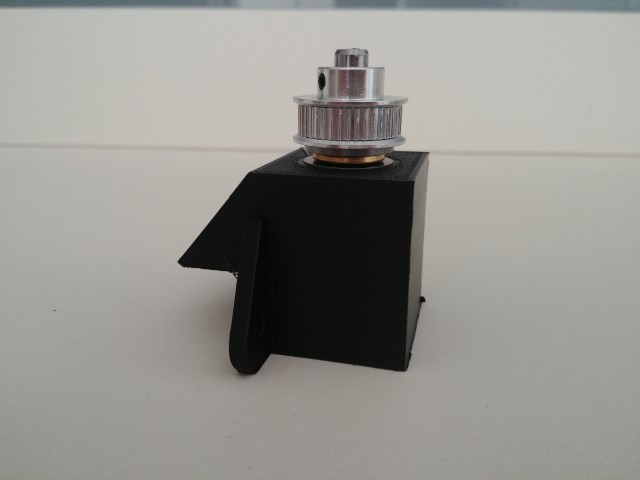
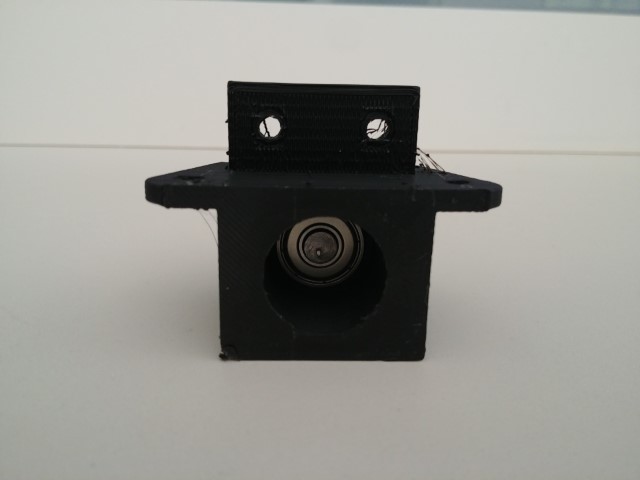
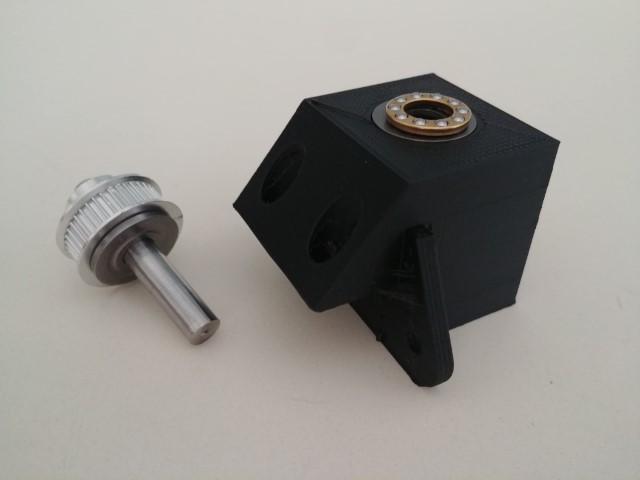
-
Looks good to me.
-
That'll do.
-
With this sort of thing I tend to think about what might go wrong and what I can do to prevent it. I try to only have to do things once. Making things as close to ideal (in the relevant properties) as possible reduces the things you have to consider if something goes wrong. If I use a plastic part in an assembly I tend to make it bulky to ensure rigidity, so I wouldn't use thin plastic flanges, even with side-webbing, to support a relatively large weight or something that will be loaded by a drive belt.
At the very least I would thicken the flange that bolts to the top side of the t-slot, maybe to the point of making it continuous with the body of the part. I'm not saying that your flange design won't be adequate, but if it isn't, you'll be redesigning and reprinting.
In the end, you should worry less about the plastic flexing and more about the t-slot it's bolted to twisting.
-
@mrehorstdmd
is something like this enough "bulky"?